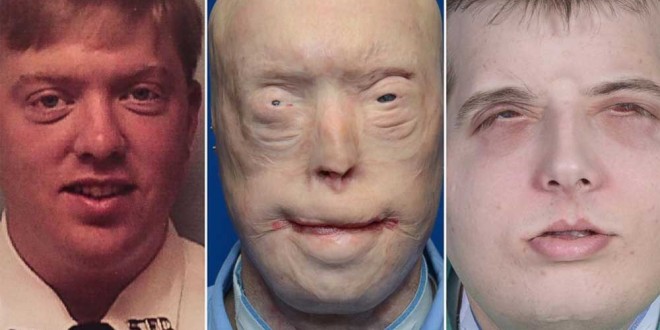Patrick Hardison, a Mississippi firefighter who suffered disfiguring burns to his face 14 years ago received a face transplant, thanks to a Brooklyn man.
In what has been described as a “historic achievement,” 41-year-old Patrick Hardison’s burned face was peeled off and replaced with that of 26-year-old New York cyclist David Rodebaugh.
In the 26-hour operation involving 100 surgeons, the donor’s ears, ear canals, chin, cheeks, nose, eyelids and blinking mechanism were removed and attached to Patrick Hardison’s face.
The transplant extended from Mr Rodebaugh’s collarbones in front all the way to the back of his head leaving only a tiny patch of Mr Hardison’s original hair.
Mr Rodebaugh’s hair has begun to grown on his new face and he is learning to shave again for the first time in 14 years.
Patrick Hardison was so badly injured in 2001 that he was left unable to blink after receiving skin grafts to reinforce what remained of his eyelids which were sewn almost shut to protect his eyes.
“I was almost totally blind,” he recalled. “I could see just a little bit.”
Patrick Hardison, who became accustomed to being stared at and playfully telling curious children that he had fought a bear, came to the attention of plastic surgeon Dr Eduardo Rodriguez in 2012.
“His face was one huge scar,” said Dr Rodriguez, who led the transplant operation at the Langone Medical Centre in New York.
“We were looking for the ideal donor, one who matched Hardison’s biological traits to minimise the risk of his body rejecting the new tissue, as well as things like skin and hair colour.”
A year later Mr Rodebaugh was identified as a potential donor after hitting his head during a bicycle collision with a pedestrian.
His mother gave permission for his face to be donated to Mr Hardiman, noting her son always wanted to be a firefighter.
Despite his face remaining swollen for a few more months, with his new eyelids Mr Hardiman is expected to recover a normal field of vision for the first time in more than a decade.
“It’s a historic achievement,” said Dr Amir Dorafshar, co-director of the face transplant programme at the Johns Hopkins University School of Medicine.
“This type of treatment option will potentially revolutionise the care of patients with severe facial burn injuries.”
Agencies/Canadajournal
 Canada Journal – News of the World Articles and videos to bring you the biggest Canadian news stories from across the country every day
Canada Journal – News of the World Articles and videos to bring you the biggest Canadian news stories from across the country every day



